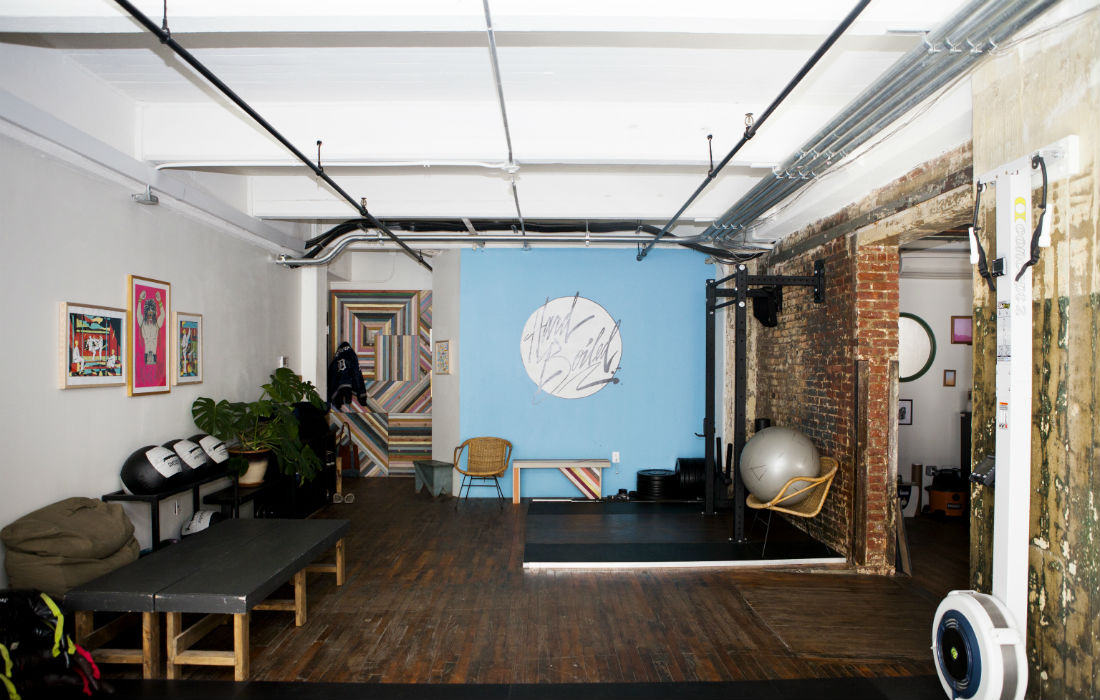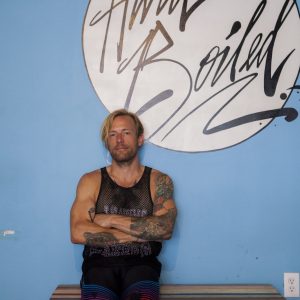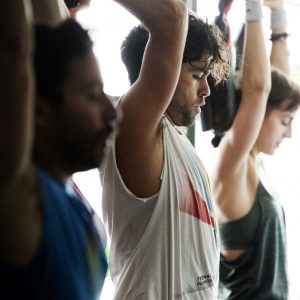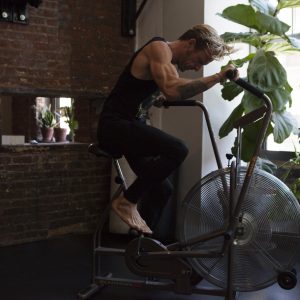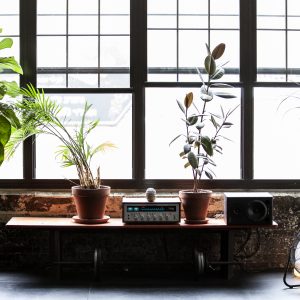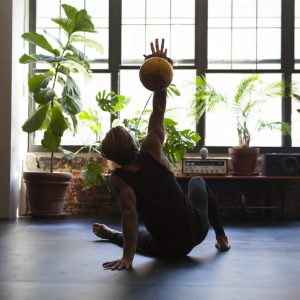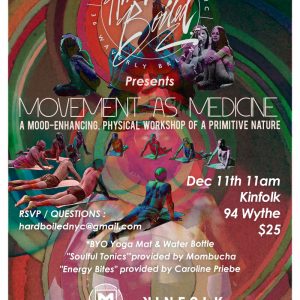Tucked in between restaurant-lined Myrtle Avenue and the Brooklyn Navy Yards lies a small functional movement studio in New York City called Hard Boiled Holistics. Owned and operated by Riki Bryan, Hard Boiled offers classes that are focused on building strength and mobility. Usually incorporating the use of kettlebells, sandbags and pull-ups, among other resistance training tools and exercises, Hard Boiled teaches its participants how they can meet their fitness goals without a lot of space, something that is certainly rare in New York City.
While at first this type of workout might be intimidating to those who have not used this type of equipment or exercised in this way before, they should definitely not be deterred from visiting the studio because Hard Boiled offers a beginner’s class on the weekend to introduce newbies to the fundamentals. We caught up with Riki recently to discuss the inception of Hard Boiled Holistics, his current class offerings, and upcoming projects.
Q. What inspired you to start Hard Boiled Holistics? When did you open the studio, and how did you design the space to your needs?
A. It’s really a bit convoluted. Essentially, I had been snowballing this concept for a lifestyle rehabilitation facility, and something of this nature and scale was a much more practical first step! I had been exploring a broad range of fitness and wellness practices, and never really found a home. Hard Boiled is a reflection of that.
We’ve been open for one year. There aren’t a lot of design elements to the space. It’s open and minimal to accommodate activities like crawling and tumbling. A big part of the practice is trying to show people a myriad of ways to get what they need with little to no equipment or space. There are no mirrors, a ton of plants, plus good audio gear and artwork. These are there by design to add warmth and stimulation, and to assist with the mind-body connection.
Q. What can newcomers expect when they participate in your introductory class on Saturdays?
A. At first, the practice at Hard Boiled can come off as technically advanced or not for beginners, when in actuality, you get up to speed pretty quickly. In every class, the first 20 minutes is spent on what I refer to as the “40 morning moves,” which is a flow-based sequence of tension release and mobility drills, dynamic stretching, and cross crawl patterning.
In a class full of beginners, I can spend more time on instruction and slow it down to get people familiar. Comfortability and vibe are very important to me! When everyone is new, people are less self-conscious and it can be more fun and less intimidating. In addition to that, I spend time on drilling the basics of human movement and strength progressions, so that everyone has a keen understanding of proper form where necessary. Safety is my number one priority. No one ever gets hurt at Hard Boiled. People leave the first class with a lot of information. We talk about the ins and outs of kettlebells, bulgarian bags, bodyweight exercise, isometerics, plyometrics, mobility, breath work and so on.
Q. We read about the 30-day challenge you offer at the studio on your blog. Can you explain how that works and what the results are for someone who participates in it? How do you provide support to those folks while they are doing such an intense workout regime?
A. [Laughs] Well, I basically started it because I had a conversation with a client in which I was encouraging him to change some things about his diet and get to more classes. He asked, “Have you ever thought about doing a challenge-type thing? ” I said, “Yeah, it starts tomorrow. Are you in?!”
A huge focus of mine, as I mentioned previously, is “lifestyle rehabilitation” and behavior programming. I want to help people discover that living in a healthy way is much simpler than vested interests would have you believe. So, this “challenge” that I put together was kind of an inside practical joke. I said, “Here it is: You come to five classes per week, and you are even allowed two cancellations. The diet is “weekend warrior” style, meaning do whatever you want on the weekends, but during the week, no refined sugar, no alcohol, no bread, no pasta, no “bad” starches, such as white or gold potatoes, rice, etc.–which I’m not saying are necessarily bad, but this is 101–and only two servings of fruit a day.
A lot of people found this to be extreme, and I had about 15 people sign up and 10 complete it, all of whom:
- Lost significant weight while gaining lean muscle;
- Got in real shape; and
- Discovered how to eat this way.
To all who completed it, I said, “Congratulations! You lived a normal life for 30 days!” and that was the inside joke. The regimen isn’t really intense at all. You’re getting 20 minutes of exercise five days a week. The intensity of that exercise in my classes is really dependent on the individual. I don’t grind people down. They need to learn to push themselves, so I facilitate, guide and encourage. Sleep. Diet. Exercise. Nutrient density. It’s that simple, but you won’t read that in The New York Times.
Q. There’s been a recent trend of people ditching happy hour drinks for wellness activities after work, and you offer a happy hour class that fits that trend. Why do you think more people are opting for healthier ways to blow off steam after the work day is over?
A. If you’re really looking to blow off steam, drinks only perpetuate that steam. Bitching about your job or whatever while impairing your judgement leads to bad choices about dinner, which leads to poor sleep, which leads to a hangover, which leads to poor decisions about breakfast and lunch, and exercise, which leads to feeling bad about yourself. Yada yada.
Also, people need social activity. In New York City, it’s really hard to find venues to socialize that don’t involve alcohol, and people need support. The enabling involved with drinking can be used to encourage healthy decisions, too. That’s why I offer “buddy passes,” which are two-for-one memberships that friends can split. It offers another layer of accountability. This was also a huge component of the 30-day challenge.
Q. We heard you’re starting a new workshop at Kinfolk in Williamsburg, Brooklyn. What is that going to look like and how can people sign up?
A. Yes! It’s a primitive movement workshop that I’m calling “Movement as Medicine,” which I have done a few variations of for different events. I’ve been looking for a place to hold it on a regular basis, and the Kinfolk 94 Wythe space is perfect. It resembles that of a geodesic dome, which is totally the ideal vibe.
It will be a 55-minute class that begins with a progression of simple breath work, tension alleviation movements, and dynamic stretching. The primary circuit has a series of strength building movements like hindu calisthenics that target the entire body with an emphasis on mobility and range of motion. It’s very stimulating to your vestibular system–think spatial orientation, balance, coordination, etc.–without being overly technical.
The whole class embodies an approach derived from Qi Gong. My goal has been to integrate flow, breath work and rhythm into a strength and conditioning practice that feels similar to a yoga practice. There will be nature projections and music that has a primitive and hypnotic vibe, and I’m hoping to add a sound bathing cool down. We’ll offer healthy food and beverage options after the class and the space will be open for hanging and general friendliness.
The class is $25, and anyone who is interested in signing up can RSVP via email to hardboilednyc@gmail.com. Participants should be sure to bring a yoga mat and a water bottle.
Q. What do you see for Hard Boiled Holistics in the future? What do you hope to accomplish in years to come?
A. I’m trying to take it one day at a time, but I still see a utopian lifestyle retreat where people just learn how to live, for instance, cook, surf, exercise and meditate, learn how to care for plants and other living things, and experience the spiritual benefits that come from that.
Images courtesy of Hard Boiled Holistics.
xx Alex
